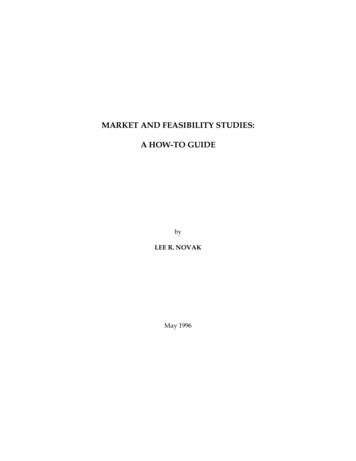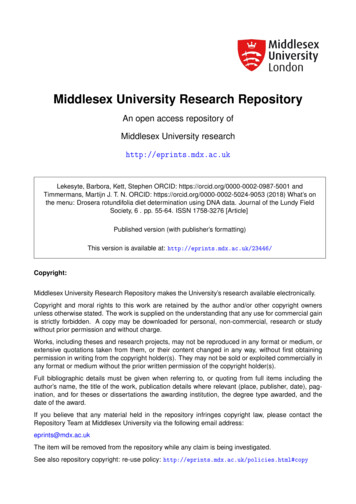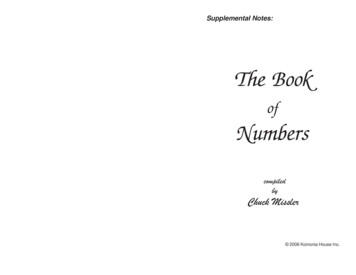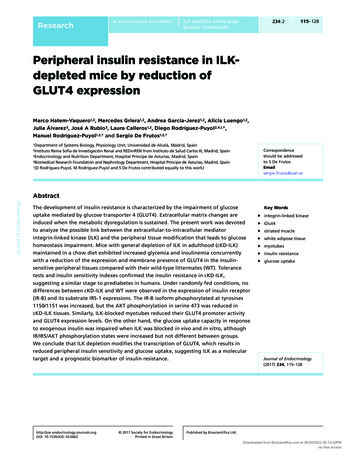
Transcription
380Alien Intrusionprove a pet theory. Masquerading angels have also concocted a pseudophilosophy to closely parallel the texts for their own evil aims. The Biblehas become “fair game” for those with their own agenda. I recall aninvestigator at a UFO meeting glowingly using the passage in Ezekielto say that “even the Bible mentions UFOs.” When I challenged hiscomment, pointing out that nowhere does Ezekiel use the term “ship,”“craft,” or any other word to describe a vehicle of any sort, and when Imade the more important point that the text clearly describes the thingas a vision from God, he replied, “Yeah, but it’s still a UFO.”I didn’t say what he wanted to hear. He had already made hismind up and brought his outside ideas to the Bible. He wanted tobelieve that it was a UFO, despite the intent of the author and theactual words written. This misreading of the Bible is sadly commonin UFOlogy.Whowere the “sons ofGod”inGenesis 6?Probably the most often-used and controversial passage ofScripture by pro-ETH UFOlogists is the account of “the sons ofGod” and their resultant offspring, the Nephilim. The description inGenesis 6:1–7 reads:When men began to multiply on the face of the ground,and daughters were born to them, the sons of God saw that thedaughters of men were fair; and they took to wife such of themas they chose. Then the Lord said, “My spirit shall not abidein man for ever, for he is flesh, but his days shall be a hundredand twenty years.” The Nephilim were on the earth in thosedays, and also afterward, when the sons of God came in tothe daughters of men, and they bore children to them. Thesewere the mighty men that were of old, the men of renown.The Lord saw that the wickedness of man was great in theearth, and that every imagination of the thoughts of his heartwas only evil continually. And the Lord was sorry that he hadmade man on the earth, and it grieved him to his heart. So theLord said, “I will blot out man whom I have created from theface of the ground, man and beast and creeping things andbirds of the air, for I am sorry that I have made them” (RevisedStandard Version).
UFOs in the Bible and Other QuestionsFor proponents of the ancient astronaut and astrogenesis theories,the “sons of God” or even the Nephilim refer to extraterrestrial visitorsto the earth. Erich von Däniken and Zechariah Sitchin, among others,believe these interfering aliens had sexual union with humans and/or genetically engineered humans or prehuman creatures in an effortto oversee mankind’s evolution. This is a grand assumption based onan interpretation of the text that is clearly incorrect. These writersadvocate, for example, that the “sons of God” is merely a descriptionby “primitive” biblical authors who did not understand the technology,describing alien visitors from the sky. However, the unity of Scripture,the Scripture test (where passages are cross-referenced with each otherto ensure they are not used out of context), and the way that expressionswere used similarly throughout all of the books of the Bible do notwarrant one particular expression to be rendered differently to othercases where it appears.The text itself readily refutes the “primitive authors” idea. In thefirst chapter of Genesis, we read that God created mankind fullyformed and intelligent. Adam was even given the job of naming allof the land animals (Gen. 2:19–20). In the subsequent chapters,we see Adam’s offspring described as musicians and craftsmen(Gen. 4:21–22), demonstrating they were not primitive. The Scripturesare full of detail to show that, prior to the account in Genesis 6, manwas already fully human, vastly intelligent, and engaging in spiritualworship — facts so readily ignored by those looking for the slightestopportunity to squeeze a UFO or two into the Bible. Unlike theirrejection of earlier passages in Genesis as being real history, they readilyaccept that the Nephilim incident in Genesis is based on true events.But their “primitive authors and UFO” interpretation is impossible ifwe accept that the earlier descriptions in Genesis are also true.However, even among Christians, the meaning of this passageis sometimes hotly debated. There are probably four major viewsregarding the expression “the sons of God” in Genesis 6, with somesurprising connections to UFOlogy:1. It refers specifically to “fallen” angels.2. It represents the “godly” descendants of Seth, one of Adam’schildren.3. They were kings or rulers who were described as “gods.”4. They were human beings possessed by demonic fallen angels.
382Alien Intrusion1. The fallen-angel viewThe early verses in Genesis 6 serve as a prelude to the “greatflood” of Noah’s day. They give the wickedness of man on the earthas the reason that God invoked this global catastrophe. Noah and hisfamily, who were aboard the ark, were the only humans to survive thisenormous world-destroying and land-reshaping cataclysm. (Many ofthe world’s present geological formations and fossils were laid down bythe catastrophic effects of the floodwater.) Although the space brothershave told many UFO contactees that the flood was a real event, in truecounterfeit fashion they have also said that it was triggered by theirintervention to cleanse the earth from its impurities.In addition, some Christian commentators believe that anotherreason for the flood was not only to destroy sinful mankind but also towipe out the offspring that resulted from the sexual union of the sonsof God and the daughters of men — the Nephilim (see later).This view is common among those who believe that the sons ofGod are fallen angels. They argue that these angels cohabited with, orhad sexual relationships with, human women. The strongest argumentfor this view comes from the simplest understanding of the text itself.The term, “sons of God,” in Hebrew, is bene (ha)elohim. It is usedfive times in the Old Testament (twice in Genesis 6, and once eachin Job 1:6, 2:1, 38:7, Authorized Version). In the passages outside ofGenesis, it is always clearly used of angels. Some claim that a similarterm is used in Hosea 1:10, but it is not exactly the same descriptionbecause it refers specifically to the children of Israel being “sons of theliving God.” One should not resort to exceptions unless there is a goodreason, but in this case there is no scriptural reason to do so. The angelsare described as sons (bene) of God because He directly created them.Contrast this to the description of the “daughters of men.” The Hebrewused here is benot (ha)adam. If the sons of God were mortal humanbeings being born of humans, then the expression used should havebeen bene (ha)adam. The text itself draws a clear distinction betweenthe offspring of humans and those directly created by God. In the NewTestament, Adam, the first man, is called “the son of god” because Godalso supernaturally created him. The New Testament also describesChristian believers on numerous occasions as “sons of God” (Rom.8:14; Gal. 3:26), but this makes sense because they have been “bornagain” and are a “new creation” in Christ (2 Cor. 5:17).3 There are
UFOs in the Bible and Other Questionssimilar expressions in the Old Testament. In Daniel 3:25, the term“son of the gods” or “like the Son of God” (bar elohim) is used, whichdescribes either an angel or a theophany that appeared with the threemen in the “fiery furnace.” (A theophany is where God appears as anangel or in human form.) The expression “sons of the mighty” (beneelim) is also used to describe angels in Psalms 29:1 and 89:6.The fallen-angel view is a common view held by the translators ofthe Septuagint (the Greek translation of the Old Testament around250 b.c.), ancient Jewish interpreters, the historian Josephus, theearliest Christian writers, and by many modern notable Christianapologists today.The biggest objection to this view is the belief that it is impossiblefor angels to have sexual relations with humans because they are spiritbeings. But as we have already seen in the UFO/abduction phenomenon,as well as in other parts of Scripture, they can also exist and manifest ata physical level.This objection is often based on a passage in Mark 12:24–25(repeated in Matt. 22:29–30). Here, Jesus was being questioned abouta hypothetical woman who, according to Jewish law, should marry thebrother of her dead husband. If there were seven brothers and they alleventually died, she would eventually have married all of them. Whowould be her husband at the resurrection of the dead? Jesus replied:Are you not in error because you do not know theScriptures or the power of God? When the dead rise, they willneither marry nor be given in marriage; they will be like theangels in heaven.Some use this passage to claim that angels are incapable of havingsex or procreating, but this is not what the Scripture says. It does sayspecifically that the angels in heaven, or those angels who obey God, donot engage in this practice. In a parallel passage in Luke 20:34–36 thecontext is made clear:Jesus replied, “The people of this age marry and are givenin marriage. But those who are considered worthy of takingpart in that age and in the resurrection from the dead willneither marry nor be given in marriage, and they can no longerdie; for they are like the angels. They are God’s children, sincethey are children of the resurrection.”
384Alien IntrusionHe answered the question primarily to affirm the reality of theresurrection and the eternal life it will bring believers (like that of theangels), contradicting the beliefs of the Sadducees, who did not believein the resurrection of the dead and who were trying to trick Jesus.In every biblical account where angels are sent by God andmanifest in physical form, the Bible records them as appearing as males,therefore with gender (e.g., Gabriel, Michael). If masquerading angelsare appearing as aliens, then the experiences of abductees suggest thatfallen angels, at least, can manifest as female, too. An unwarrantedextrapolation of the above text is used to suggest that because believerswill not be married in the resurrection life, they will also be genderless(supposedly like the angels). Once again, the passage tells us only thatpeople will not be married in heaven, although they do marry now.God’s ordained purpose for marriage was for procreation to populatethe earth. Each of the angels was supernaturally created, so there was noneed for procreation, and in this way we will be like them. Christians willnot marry each other in the new heavens and Earth. They (the church)will be “married” to Christ, as His bride, throughout eternity. Thisexpression is applied figuratively; Christ has redeemed His followers byHis death and resurrection. Human beings have an individual identity,which they will never lose, and even angels are identified as individuals.It would seem strange that we would not retain our identities, of whichbeing male or female is an integral part, in the resurrection life.The fallen-angel view of the sons of God is a provocative concept,and thus it remains an unacceptable explanation to many. Some arguevehemently against it and have tried to explain the passage in other ways.Around the fifth century a.d. the fallen-angel view came increasinglyunder attack. Some theologians claimed that it was impossible forangels to father children by human women.4 Proponents of the fallenangel view have often pointed out, however, that angels appeared inphysical bodies, such as the three visitors to Abraham who sat, ate, andspoke with him (Gen. 18:1–15). We would presume then that theymust have had the necessary digestive systems to be able to do this.In another example, angels appeared to the inhabitants of Sodom insuch a form that the depraved Sodomites wanted them for homosexualrelations (this is where the word sodomy comes from).2. The Sethite viewThe adherents to the Sethite view believe that the “sons of God”were a hereditary line descended from Seth, and that this was a
UFOs in the Bible and Other QuestionsGod-fearing lineage. The scriptural support for this idea comes fromGenesis 4:25–26, which describes the birth of Seth to his father Adam.It says:Adam lay with his wife again, and she gave birth to a sonand named him Seth, saying, “God has granted me anotherchild in place of Abel, since Cain killed him.” Seth also had ason, and he named him Enosh. At that time men began to callon the name of the Lord.It was assumed to be a godly line because the passage says that menbegan to call out to God. However, some Christian apologists, citingancient biblical historians, claim that “call” has been mistranslated andshould actually read “profane.”5 In any case, it doesn’t really matter.There were many generations after Enosh, and family heritage is not anautomatic producer of piety.This view also holds that the daughters of men were descendedfrom the evil Cain (who murdered his brother Abel). If this were thecase, however, one wonders why the Scripture did not say “sons ofSeth” and “daughters of Cain.”6 There does not appear to be any textualbasis for applying exclusivity to Seth’s or Cain’s lineage. If there is anydistinctive human line at all, benoth Adam means the daughters ofAdam, which ultimately means all women anyway. There is nothing tosuggest that Seth’s line was any more pious than anyone else on the faceof the earth, and conversely, there is no implication that any daughtersof Cain would have been more sinful than anyone else. According to1 John 3:12, Cain belonged to “the wicked one” because he murderedhis brother Abel, but this passage does not refer to his offspring. Ifthe remaining descendants of Seth were so “godly,” why were they notspared the judgment on sin that everyone received, except Noah andhis family? Some have also claimed that when it says the sons of God“took” (Hebrew laqach) wives for themselves, the Hebrew implies amore violent “taking” than one usually associates with the normalprocess of betrothal. But to “take a wife” is a common term in Hebrewas well as in English. Strong’s Concordance says that the Hebrew verbcan mean “to take, get, fetch, lay hold of, seize, receive, acquire, buy,bring, marry, take a wife, snatch or to take away” — such a range ofmeanings does not provide a strong argument to support the claim thatthis was a violent “taking.”
386Alien Intrusion3. Kings and rulersWhile it is true that many ancient rulers (and some modern ones,for that matter) have declared themselves to be gods, once again, itis hard to see any scriptural support for this claim. The text does notimply this; it is an outside idea. The term “mighty men” is often usedto suggest that they may have been kings or leaders, but as we shall see,this is not what the term means.Also, the Nephilim (the offspring of this union) are always referredto in the masculine gender. Surely the offspring of human parentswould occasionally produce female children as well.4. DemonsThe view that fallen angels, or demons (are they the same? — seelater), possessed, or inhabited, the bodies of men, and perhaps women,is entirely possible, and we see this phenomenon throughout Scripture.The practices of channeling, automatic writing, and perhaps even theabduction experience itself are forms of demonic possession. This thenbegs the question of who are the Nephilim and why are they expresslymentioned as the offspring of this union? Nowhere else in Scriptureare the offspring of demon-possessed people, or anybody else, for thatmatter, singled out and then automatically classified as “fallen.”The offspring — “as in the days of Noah”The word Nephilim was actually left untranslated by the Englishtranslators. In some earlier versions the word was rendered as “giants.”It is entirely possible that these beings were indeed very large, so inone sense this translation could be correct. But its literal meaning is“fallen ones,” from the Hebrew root word naphal, meaning “to fall orto be cast down.” Why were these offspring, if they were the progenyof human parents (whether kings, ungodly, or demonically possessed)automatically condemned by God and regarded as fallen? Being borninto an ungodly family by unbelieving parents does not mean that oneis excluded from the promises of God that arise from faith in Him.Some have suggested that the Nephilim were condemned becausethey were not fully human. This comes from the view that the sons ofGod were angels that cohabited with women to produce half-angelic/half-human beings — a hybrid offspring. Another often-quotedScripture to support the angel view is Jude 6–7:
UFOs in the Bible and Other QuestionsAnd the angels who did not keep their positions ofauthority but abandoned their own home — these he has keptin darkness, bound with everlasting chains for judgment onthe great Day. In a similar way, Sodom and Gomorrah and thesurrounding towns gave themselves up to sexual immoralityand perversion. They serve as an example of those who sufferthe punishment of eternal fire [emphasis added].The passage clearly links the perverted sexual practices of Sodomand Gomorrah with fallen angels who have not “kept their place.”But what are the “everlasting chains for judgment?” The next passagedescribes angels who have been “locked up” awaiting their eternal andfinal punishment. Moreover, the word “hell” in this next passage isthe Greek word tartarus, which occurs nowhere else in Scripture. Themost common occurrence of the word hell is a translation from sheol inthe Old Testament and hades in the New Testament, which describesa place of departed spirits. This distinctive treatment of fallen angels isalso completely different to any other account in the Bible, because weknow that even Satan himself and his minions are still allowed to roamabout the earth. The aforementioned passages, read in isolation, arehard to understand, but they make sense when read with the view thatthe sons of God in Genesis 6 were possibly fallen angels.For if God did not spare angels when they sinned, but sentthem to hell [tartarus], putting them into gloomy dungeonsto be held for judgment; if he did not spare the ancientworld when he brought the flood on its ungodly people,but protected Noah, a preacher of righteousness, and sevenothers; if he condemned the cities of Sodom and Gomorrahby burning them to ashes, and made them an example of whatis going to happen to the ungodly (2 Pet. 2:4–5).But why was this group of miscreant angels kept in chains? In theaforementioned passage, once again, specific angels are juxtaposed tothe time of Noah and the sinful practices of Sodom and Gomorrah.This is the second specific reference to angels being imprisoned at thetime of Noah. One can only presume that these particular angels didnot play by the rules and that they stepped outside the boundariesof normal warfare engagement. In a sense, they had committed warcrimes or acts of atrocity upon human beings. If these demonic angels
388Alien Intrusionhad possessed human beings, why were they singled out for harshertreatment, since demonic possession occurred after that time and isapparently still occurring today? Some commentators also refer to1 Peter 3:18–20, which says:For Christ died for sins once for all, the righteous for theunrighteous, to bring you to God. He was put to death inthe body but made alive by the Spirit, through whom also hewent and preached to the spirits in prison who disobeyed long agowhen God waited patiently in the days of Noah while the arkwas being built. In it only a few people, eight in all, were savedthrough water [emphasis added].This could possibly be a third mention of the fallen angels ofNoah’s time. Although the word spirit(s) is used of angels, it can referto man’s spirit also. However, the text does specify a “prison,” which fitswith the idea of “chains” previously mentioned in relation to tartarus.The whole concept of a certain group of angels participatingin perverse acts is very thought-provoking because Jesus was askedabout the signs that would precede His second coming. He said inLuke 17:26:Just as it was in the days of Noah, so also will it be in thedays of the Son of Man.Of course, Jesus was warning His listeners that the people ofNoah’s day did not expect the catastrophe that befell them. ButGenesis 6:11–13 also tells us that the world at that time was violentand corrupt.Some suggest the intriguing possibility that Jesus’ warning mayhave also referred to angelic sexual interference with humans. Theyalso believe that this prophecy is being fulfilled today with “alien”abductions and their alleged associated sexual practices. In addition,some also believe that the modern hybrid alien/humans are real livingoffspring, similar to the Nephilim of Genesis 6. However, the difficultywith this view is that the original group of angels who procreated (asopposed to some who might just have engaged in sexual activity — ifthat is possible) were apparently locked up in tartarus to await judgmentat the end of time. If the angels in Noah’s day were imprisoned for thissort of behavior, why wouldn’t all angels who partake in these practicestoday automatically be locked up by God as well? Unless, perhaps, it
UFOs in the Bible and Other Questionsis a prelude to the “end times” (“just as in the days of Noah”) whenliterally “all hell breaks loose” before God finally deals with thesematters on Judgment Day. At least this line of thought has someinteresting parallels to our study.A few apologists suggest that fallen angels are distinctly differentfrom demons, based on the view that wherever demons are mentionedin Scripture, they seem to require embodiment in a biologicalcreature, whereas angels do not. These apologists believe that demonsare the disembodied spirits of the Nephilim destroyed in the Flood.Interestingly, the apocryphal (non-canonical) book of Enoch alsodescribes the spirits of the Nephilim as evil spirits roaming about theearth. An account that would seem to support this idea is found inthe Gospel of Mark, chapter 5. After Jesus crossed the lake in a boat,the chapter says:When Jesus got out of the boat, a man with an evil spiritcame from the tombs to meet him . When he saw Jesusfrom a distance, he ran and fell on his knees in front of him.He shouted at the top of his voice, “What do you want withme, Jesus, Son of the Most High God? Swear to God that youwon’t torture me!” For Jesus had said to him, “Come out ofthis man, you evil spirit!”Then Jesus asked him, “What is your name?”“My name is Legion,” he replied, “for we are many.” And hebegged Jesus again and again not to send them out of the area.A large herd of pigs was feeding on the nearby hillside.The demons begged Jesus, “Send us among the pigs; allow usto go into them.” He gave them permission, and the evil spiritscame out and went into the pigs (Mark 5:2–13).Note how the demons requested permission to possess the pigs.The view that the disembodied spirits of the Nephilim are demons is aradical view, but it does have some scriptural support.Although angels are described as spirits, so are human beings.Jesus was described as quickening spirit, there is the Holy Spirit, andGod is spirit. It would appear the spirit is part of our being and notnecessarily the sum of it. Additionally, in the New Testament, theexpressions “demon” and “evil spirit” (as opposed to just “spirit” oreven “ministering spirits”) seem to be interchangeable. Also note thefollowing passage:
390Alien IntrusionThe Spirit clearly says that in latter times some willabandon the faith and follow deceiving spirits and thingstaught by demons (emphasis mine 1 Timothy 4:1).This seems to distinguish between spirits and demons.The NephilimAs mentioned previously, some claim there was another reason forGod invoking the Great Flood upon the whole earth. It served thepurpose of destroying the Nephilim.A popular view is that these half-human/half-angel beings retainedsome of the supernatural characteristics of their fathers. This made themeffectively superhuman, and they thus wielded undue influence overhuman affairs with their superior knowledge and strength. This viewarose because of the description of the Nephilim as the “mighty menof old” and “men of renown” in Genesis 6:4. God had already said thatHe was going to shorten the days of mankind because He could nottolerate their wickedness any longer. It has also been suggested that theangels created the Nephilim in order to infiltrate the human gene pool.Satan had been warned in the Garden of Eden that enmity or hostilitywould exist between his offspring and the offspring of the first woman(and obviously the first man, Adam). In Genesis 3:15, Satan is describedas having offspring in the same context as that of the woman. Satanheard from God that the woman’s offspring was going to crush his head.This “offspring” may be understood generically as all humans, but morelikely it is a specific reference to Christ, who, although God, was bornof a woman. Interestingly, a deeper look at the expression “offspring”reveals that most translations render the word as “seed,” as in a child bornin the normal manner — it can also literally refer to semen.Is it possible that these “sons of God” were trying to corrupt thehuman line (through the daughters of Adam/men) from which theMessiah was to come, and that this was another reason that Noahand his family was spared? As well as their being God-fearing, doesthe Scripture also suggest that they were untainted genetically by anyangelic influence? Genesis 6:9 also says that Noah was perfect in hisgenerations:These are the generations of Noah: Noah was a just manand perfect in his generations, and Noah walked with God(Authorized Version).
UFOs in the Bible and Other QuestionsThe first mention of the “generations” of Noah in this passagerefers to his family line (Hebrew toledoth). The subsequent “perfect inhis generations” means that he was without spot or blemish (tamiym)in his time or in the generation (dowr) in which he lived. The Hebrewword tamiym refers to physical, or bodily, perfection, and is the sameword that was used for animals of sacrificial purity throughout the OldTestament. Perhaps it was not exclusively referring to Noah’s spiritualor moral perfection.7Satan has conspired on several occasions to circumvent God’s planof salvation. At the time of the birth of Christ, Satan tried, throughthe evil king Herod, to kill all the male babies who were born at thepredicted time and city of the birth of Christ. Satan, knowing theOld Testament prophecy in Micah 5:2, knew the time and place(Bethlehem) of the birth of Jesus. Moreover, on several occasions inhistory, attempts have been made to exterminate the Jewish race.Taking this view a little further, Hebrews 2:16 (Authorized Version)talks about the act of saving grace of Jesus Christ and reminds us thatthis did not involve Jesus taking on the form of angels, but humanform — as a physical descendant of Abraham:For verily he took not on him the nature of angels; but hetook on him the seed of Abraham.There is no salvation for angels once they have rejected God andtheir heavenly abode. Only the physical descendants of the first Adamcan be saved via the death and resurrection of the “last Adam.” Someadherents to the angelic view believe that once the human race hadbeen genetically corrupted by angelic seed, they would have fallenoutside of God’s plan of salvation for the human race (note Nephilim “fallen ones”), since we need to be the literal descendants of Adam(1 Cor. 15:21–22), the first human who brought sin into the world.If God sent the Flood and destroyed the world because of theextreme wickedness of man and because angels raised the intensity ofthe battle a notch or two, is it possible that fallen angels have crossedthe line again? Some think that the enormous and increasing UFO/abduction activity we are seeing today is a manifestation of what Jesusforetold — “just as it was in the days of Noah.” However, it may justrefer to a time when fallen angels increase their deceptive practices uponmankind. The people of Noah’s day ignored the warning and perished.They missed the way of escape through the ark of salvation that God
392Alien Intrusionprovided. Today, God has provided another ark (figuratively) — that isJesus Christ — for those who believe in His act of saving grace. Timessimilar to Noah’s, Christ said, would be a prelude to His return.And “after that,” the land of the giantsThe Authorized Version of Genesis 6:4 gives an important, butpuzzling, description of Nephilim and other events before the Flood.The text says “and after that” (some translations say “afterwards”), butwhat is the order of events?There were giants [Nephilim] in the earth in those days;and also after that, when the sons of God came in unto thedaughters of men, and they bare children to them, the samebecame mighty men which were of old, men of renown.“Afterwards” is often presumed to mean after the Flood andinclude the mentioning of the Nephilim when the Hebrew nation wasabout to enter the Promised Land after 400 years of slavery in Egypt(Num. 13:33). This interpretation would be a major blow to the viewthat God used the Flood to destroy the Nephilim.Genesis 6:1 refers to a time “when men began to increase innumber upon the earth.” According to rabbinical (Orthodox Jewish)interpretations of Genesis 6, the Nephilim were so named because theywere fallen and caused the world to fall.8 It gives the impression thatthese events occurred at a time early in Earth’s history when mankindwas starting to increase in number, and at this time the sons of Godtook for themselves any women that they wanted.It should be clearly noted that the Nephilim in this passage cannotrefer to any people group or human beings who survived the Flood inaddition to Noah and his family. Those on the ark were the only humansurvivors. The term “after that” simply contrasts to an initial time whenthe sons of God took women and then had c
people will not be married in heaven, although they do marry now. God's ordained purpose for marriage was for procreation to populate the earth. Each of the angels was supernaturally created, so there was no need for procreation, and in this way we will be like them. Christians will not marry each other in the new heavens and Earth.











